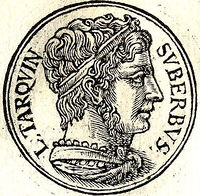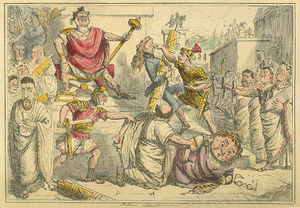Lucius Tarquinius Superbus
| Lucius Tarquinius Superbus | |
|---|---|
| King of Rome | |
 |
|
| Lucius Tarquinius Superbus | |
| Reign | 535 – 509 B.C. |
| Predecessor | Servius Tullius |
| Successor | Office abolished |
| Consort to | Tullia |
| Offspring | Sextus Tarquinius |
| Father | Lucius Tarquinius Priscus |
| Mother | Tanaquil |
Lucius Tarquinius Superbus (535 B.C. – 496 B.C.) was the seventh King of Rome, reigning from 535 until the Roman revolt in 509 B.C. which would lead to the establishment of the Roman Republic. He is more commonly known by his cognomen Tarquinius Superbus and was a member of the Etruscan dynasty of Rome. The historian Dionysius of Halicarnassus may have divided one historical figure named Tarquin into two separate kings because of problems with dating their legendary events. Superbus was also called Tarquin the Proud[1] and Tarquin II among other titles / names. It is said that Superbus killed the preceding king, Servius Tullius to make himself king of Rome.
Superbus' father, Lucius Tarquinius Priscus, was the fifth King of Rome reigning from 616-579 B.C. HIs grand-father was said to be Demaratus the Corinthian, from the Greek city of Corinth. Priscus came from the Etruscan city of Tarquinii. Disgruntled with his opportunities in Etruria, Priscus migrated to Rome with his wife Tanaquil, at her suggestion. A propitious omen is said to have led to Priscus' establishment as King of Rome.
There are few surviving sources on Superbus' reign, and he is described as a tyrant and dictator when ruling the kingdom. He directed much of his attention to ambitious war plans and he eventually annexed various Latin neighboring city states. In 509 B.C. the people revolted as a result of his son Sextus Tarquinius' rape of Lucretia, who was an important noblewoman in the kingdom.
Contents |
Early life
Superbus' mother, Queen Tanaquil had aided in the selection of Servius Tullius, Tarquin's brother-in-law, as heir to the Roman throne upon the assassination of Lucius Tarquinius Priscus by the sons of the previous king (Ancus Marcius) in 579 BC. Tarquin's brother Aruns Tarquinius had married Servius Tullius' daughter Tullia. However Tullia arranged a plot with Tarquin to usurp the throne by killing Aruns Tarquinius and the king, Servius Tullius.[2] Legend dates this event to 534 BC. Tarquin then summoned the Senate, in which Tullia proclaimed him the "new king." The new king murdered Servius Tullius, after which Tullia ran over her father's body with her chariot.[3] Then he executed the leading senators who he thought supported the king.[2]
Tarquin orchestrated the murders of key senators who supported Servius Tullius and proceeded at once to repeal the recent social reforms in the constitution, seeking to establish a pure despotism in their place. Wars were waged with the Latins and Etruscans, but the lower classes were deprived of their arms and employed in erecting monuments of regal magnificence (and some important public works, such as the Cloaca Maxima), while the sovereign recruited his armies from his own retainers and from the forces of foreign allies.
Reign

Tarquin's authority over the city was confirmed by four initial actions: the leveling of the top of the Tarpeian Rock that overlooked the Forum and the removal of its ancient Sabine shrines; the completion of the fortress temple to Jupiter on the nearby Capitoline Hill; and the marriage of his son to the daughter of Octavius Mamilius of Tusculum, the most powerful of the Latin chiefs, an alliance which secured him powerful assistance in the field.[4] Under Tarquin, Rome became eventually the acknowledged head of the Latin confederacy. Any Latin chiefs, like Turnus Herdonius, who attempted to resist him, were treated as traitors and punished with death.
Tarquin turned his arms against the Volscians. He took the wealthy town of Suessa Pometia, with the spoils of which he commenced the erection of the Temple of Jupiter on the Capitol which his father had vowed. In order to secure his Volscian conquests, Tarquinius founded the colonies of Signia and Circeii. He was next engaged in a war with Gabii, one of the Latin cities, which refused to enter into the league. Unable to take the city by force of arms, Tarquinius had recourse to a clever stratagem. His son, Sextus, pretending to be ill-treated by his father, and covered with the bloody marks of stripes, fled to Gabii. The infatuated inhabitants entrusted him with the command of their troops, and when he had obtained the unlimited confidence of the citizens, he sent a messenger to his father to inquire how he should deliver the city into his hands. The king, who was walking in his garden when the messenger arrived, made no reply, but kept striking off the heads of the tallest poppies with his stick. Sextus took the hint. He put to death or banished, on false charges, all the leading men of the place, and then had no difficulty in compelling it to submit to his father.
According to one story, when Superbus was approached by the Cumaean Sibyl, she offered him nine books of prophecy at an exorbitant price. Superbus refused abruptly, and the Sibyl proceeded to burn three of the nine. She then offered him the remaining books, but at the same price. Superbus hesitated, but refused again. The Sibyl then burned three more books and again offered Tarquin the three remaining Sibylline Books at the original price. At last Superbus accepted.[5] As the Sibylline Books were housed in the fortress temple of Jupiter, their legend has been associated with him.[6]
Superbus' reign was characterised by bloodshed and violence. His son, Sextus Tarquinius', rape of Lucretia laid the seeds for a revolt. Lucretia's kinsman Lucius Junius Brutus (himself a member of the Tarquin dynasty) and Lucretia's widowed husband, Lucius Tarquinius Collatinus (grand-nephew of Tarquinus Priscus and thus also a member of the dynasty) led the revolt, along with Publius Valerius Poplicola, and Lucretia's aging father, Spurius Lucretius Tricipitinus. That uprising resulted in the exile, after a reign of twenty-five years, of Superbus and his family, and the establishment of the Roman Republic, with Brutus and Collatinus as the first consuls.[7]
After his exile, Superbus attempted to gain the support of other Etruscan and Latin kings, claiming that republicanism would spread beyond Rome. Even though the powerful Etruscan lord Lars Porsenna of Clusium (modern Chiusi) backed Superbus' return, all efforts to force his way back to the throne were in vain.[8] He left two older sons, Titus Tarquinius and Aruns Tarquinius, who was killed in 509 BC in one of his father's wars to regain the throne. Tarquin died in exile at Cumae, Campania in 496 BC.[5]
Cultural references
Superbus appears as the villain in Shakespeare's narrative poem, The Rape of Lucrece (1593-4). Macbeth also mentions Tarquin in his famous dagger soliloquy (2.1.55). The libretto from Benjamin Britten's opera The Rape of Lucretia (1946) was adapted by librettist Ronald Duncan from The Rape of Lucrece, in which Tarquinius is a key role. According to Livy, Tarqinius cut off the heads of the tallest poppies in his garden as an allegory to instruct his son Sextus Tarquinius to pacify a recently-conquered enemy city by executing its leading citizens. This leads to the modern expression of "Tall Poppy Syndrome" to describe the phenomenon of tearing down individuals who rise too far above the majority. A quote concerning Tarquin and the poppy allegory appears in Kierkegaard's Fear and Trembling. Patrick Henry refers to Tarquin in his famous speech ending, "If this be treason, then make the most of it."
References
 This article incorporates text from a publication now in the public domain: Chisholm, Hugh, ed (1911). Encyclopædia Britannica (Eleventh ed.). Cambridge University Press.
This article incorporates text from a publication now in the public domain: Chisholm, Hugh, ed (1911). Encyclopædia Britannica (Eleventh ed.). Cambridge University Press.
- ↑ Dictionary definition of Superbus
- ↑ 2.0 2.1 Dixon-Kennedy, Mike (1998). Encyclopedia of Greco-Roman Mythology. ABC-CLIO. p. 289. ISBN 978-1576071298. http://books.google.com/books?id=2U7okUE3PIcC.
- ↑ Livius, Titus (25 B.C.). "46-88, 59". Ab Urbe condita. 1. trans. by Daniel Spillan, A.M. M.D.. Henry G. Bohn. http://www.gutenberg.org/files/19725/19725-h/19725-h.htm.
- ↑ Arnold, Thomas (1886). History of Rome. T. Fellowes. pp. 44–5. http://books.google.com/books?id=aP0LAAAAYAAJ.
- ↑ 5.0 5.1 Ring, Trudy; Salkin, Robert M.; La Boda, Sharon (1996). International Dictionary of Historic Places. Taylor & Francis. pp. 176–8. ISBN 978-1884964022. http://books.google.com/books?id=74JI2UlcU8AC.
- ↑ Ihne, Wilhelm (1871). The History of Rome. Longmans, Green and Co.. pp. 71–91. http://books.google.com/books?id=xccoAAAAYAAJ.
- ↑ Gale, Robert L. (1995). A Herman Melville encyclopedia. Greenwood Publishing Group. p. 504. ISBN 978-0313290114. http://books.google.com/books?id=M7Fo3O4f9PkC.
- ↑ Cornell, Tim (1995). The Beginnings of Rome. Routledge. pp. 215–17. ISBN 978-0415015967. http://books.google.com/books?id=EAEOAAAAQAAJ. Retrieved 2009-04-22.
External links
| Regnal titles | ||
|---|---|---|
| Preceded by Servius Tullius |
King of Rome 535–509 |
Succeeded by Office abolished |
|
|||||
|
||||||||||||||||||||||||||
